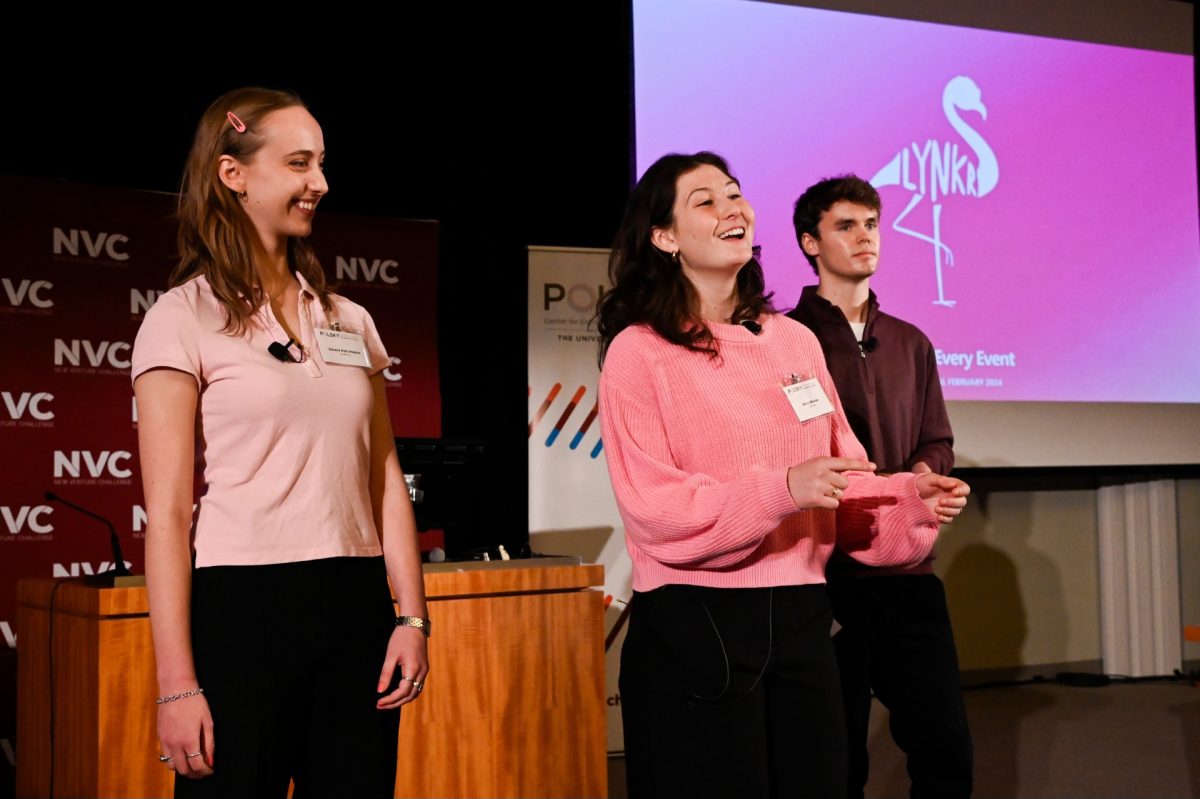On March 1, the team behind social event-planning app Lynkr won the 12th annual College New Venture Challenge (CNVC), a competition where undergraduate-led startups can win funding from the University’s Polsky Center for Entrepreneurship and Innovation.
The app allows students to plan and invite fellow students to parties and other campus events. Among Lynkr’s features include the ability for organizations like fraternities and clubs to create and join “groups” on the app, a log where users can see the events they’ve hosted and attended, and a searchable page of events being planned by groups across campus.
Participation in the CNVC requires enrollment in the Booth School of Business course Developing a New Venture during winter quarter. The competition itself includes a pitch to a panel of investors and entrepreneurs that takes place at the end of the quarter.
Lynkr’s team during the CNVC included second-year Founder and Chief Executive Officer Emily Wheeler, second-year Head of Operations and Growth Geneva Kirk Drayson, fourth-year Head of Finance RJ Czajkowski, and separate student-run teams for both social media and growth and operations. Wheeler and Kirk Drayson are the only members of the CNVC team who will remain a part of Lynkr post-CNVC, and in an email to the Maroon, Wheeler confirmed that she will be taking a leave of absence from UChicago this fall to work on Lynkr full-time and help “grow it to its full potential.”
Thirty-nine teams applied to participate in this round of CNVC, of which 13 teams were chosen to advance to the classroom round. These teams were further narrowed to seven finalists that took part in the final round of pitching and presented their business plans to a team of judges, which, according to the Polsky Center’s website, included Chicago-area investors, entrepreneurs, alumni, and faculty.
All seven finalist teams received funding, but as the first-place winner, the Lynkr team took home $160,000 of funding, the highest amount ever awarded to an undergraduate group in CNVC history. Throughout its twelve-year history, the CNVC has accelerated the development of hundreds of businesses still in operation today according to the Polsky Center’s website, one of the most successful being the food delivery platform, Grubhub.
“It was honestly just a lot of excitement. At no point was it terrifying,” said Kirk Drayson. “The dynamic between me, Emily [Wheeler], and RJ [Czajkowski] was always really positive—we bounced off each other really well, and it was always really fun. And when we went into the [presentation] room, all of these Lynkr fans trickled in for our presentation lining the sides of the room in pink bucket hats. It was great to have all of their support.”
Lynkr’s focus on college students is a major part of why it stands out among its competitors, according to Wheeler and Kirk Drayson. Wheeler specifically mentioned that the team wanted to address many of the grievances that college students have with pre-existing event-planning websites and apps.
“We include the ability to invite entire groups with one click,” said Wheeler. “Let’s say you wanted to invite the Organization of Latin American Students—you can search for that and click them and invite them all in one go. We also have blocklists, whitelists, the ability to request an invite to an event, and other things that platforms like Eventbrite or Ticketmaster wouldn’t cater to. And we also have a ticketing feature, so clubs and organizations can not only plan their event on Lynkr, but charge for it and do all that in one go.”
“A lot of these platforms are not only focused on just the user, they’re also sort of overly focused on Greek life,” Kirk Drayson said about Lynkr’s existing competitors. “So the message that Lynkr is trying to spread is inclusivity, making sure everybody feels that sense of community regardless of social status.”
Given how focused they are on catering the app to students’ needs, Wheeler also emphasized the team’s desire to grow the user base past college students.
“I think those college-specific features really helped Lynkr stick out from other platforms, but one of the things that our team was thinking about was growing with our users beyond college,” Wheeler said. “We think it’s such a shame that when you graduate, you lose that sense of community. And so we’re hoping that as we grow with our users, they can join alumni groups, parent groups, pickleball groups, or whatever.”
Despite their success in front of investors, Lynkr has seen some pushback among students online. Anonymous posts on the social media app Sidechat have called into question whether Lynkr offers much more than existing platforms like Facebook’s Events page and whether the team should have won the CNVC. However, Wheeler says this attention has actually helped Lynkr instead of hindering it.
“It’s interesting, because when we’re communicating with groups on campus, people are really, really excited about [Lynkr]. And Sidechat has actually been surprisingly pretty good for us—on the days when Lynkr has come up, we’ve gotten hundreds of downloads just from people having active conversations about it. So I think it’s been an overall positive,” Wheeler said.
As the team moves forward, Wheeler is looking at brand partnerships as the next step in the company’s development.
“Brands like Red Bull and Celsius are trying to get their name out to Gen Z, so what we’re trying to do is pair these brands with student groups so brands can get their name out and student groups can get free things,” she said. “We’re working with brands that span from large companies like Red Bull to local small businesses that are just trying to get their name out there.








